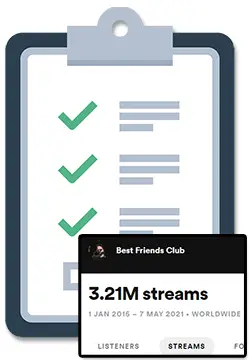When working on a new song that uses samples, I began to wonder if sampling music is cheating, so I researched and wrote about it.
Sampling music is not cheating. There is no cheating in music unless you take someone’s finished work without changing it whatsoever. Many great producers like J Dilla, Kanye West, and Daft Punk have sampled music to create new music.
With that said, there can be legal and ethical concerns when it comes to sampling music, particularly if you plan to release and profit off of the music you create with samples. For a more detailed look into general music copyright, check out The Music Copyright Manual over on Amazon.
However, I’ve taken the time to look into these particular concerns around sampling for you so that after reading this article you can go on and make some great music without having to worry if sampling is cheating or not.
How To Use Sampling In Music Without Cheating
Sampling recorded music is not a new thing.
As far back as the 1980s, DJs and hip-hop artists particularly relied on sampling older disco and R&B songs to create some amazing new pieces of work that sounded nothing like the originally sampled material.
This practice of sampling music is still very alive and well today, which is why you may hear a new song on the radio and find it to be very familiar.
It may very well be that it sounds familiar because you’ve actually heard it before.
What is not cheating
With that said, for your music to not be considered cheating you need to put your own spin on the sampled material.
Music that uses samples that are not considered cheating include:
- Songs where the original sample is modified beyond recognition
- Songs that use percussive samples like drums, snares, and hi-hats
- Lofi songs that include longer melodic samples
- Remixes that are in a different style and are clearly identified as remixes
Ultimately, what is “considered to be cheating” is subjective. But as long as you put your own spin on it, remember that real music listeners just want to hear great music.
Just put your own spin on the music that you have sampled to make sure you are truly ending up with what can be considered an original piece of music.
What is considered cheating
Because “cheating” in music, is a subjective thing. There are really three people you need to consider:
- Other creatives (ie: producers, artists, etc)
- Actual music listeners
- Lawyers
In most cases, any negativity from other producers is coming from a place of jealousy or elitism. So just forget about them.
However, actual music listeners may think you are cheating if:
- You sample another artist’s work and don’t put your own spin on it
- You take another artist’s song and try to pass it off as your own
- You create a remix but don’t explicitly state it is a remix
With that said, when it comes to releasing and profiting off your music, sampling another artist’s work without permission is considered cheating in the eyes of the law.
The difference between cheating and copyright
If you are sampling music in Ableton Live for creative purposes only, then it is all good and you are not cheating.
However, if you sample music and seek to profit off your music, that is cheating in the form of copyright infringement.
So how can you incorporate sampling into your music without cheating or infringing on copyright?
First, we need to breakdown the actual forms of sampling that are available to you. There are intricate details in both methods that decide if you are in the clear or not.
The two main methods of sampling are:
- Sampling very short snippets of music to use in your own song
- Sampling longer sections of music to use in your own song
Let’s dive into both methods individually to get the best overall picture of how you can sample music without cheating.
Is It Cheating To Use Short Samples In Music?
The first method of sampling is by using short snippets of music, usually between 1 to 3 seconds of time.
Using short samples in music is not cheating.
This is an extremely common way to use sampling in music, because it is very unlikely you will run into copyright issues or other lame producers calling your music unoriginal.
These types of short samples are usually:
- Individual drum sounds (ie: kick, snare, hi-hat, etc)
- A single note of an instrument (ie: piano, guitar, vocal, etc)
- A chord of an instrument (ie: piano, guitar, synth, etc)
Generally, when it comes to drum sounds you are very much in the clear in terms of both cheating and copyright.
When it comes to drums and copyright, this is what you need to know:
Drum loops, drum beats, and drum patterns are not copyrighted because they aren’t technically considered songwriting.
Most copyright laws state that only a piece of music’s lyrics, melody, harmony, and rhythm can be copyrighted.
This can be a bit trickier from a copyright standpoint if you sampling melodic elements like notes or chords.
If the sample is shorter it is easier to get away with it, however, the conversation can drastically change when it comes to longer melodic samples.
Is It Cheating To Use Long Samples In Music?
When it comes to sampling longer pieces of music, there can be some technical issues that come up that you should be aware of.
Using long samples in your music is not cheating. However, you may encounter copyright issues.
If your end goal is to create an original piece of music that samples long melodic sections of another artist’s work then this is not cheating.
However, if you plan to release and profit off this particular music, then you may very likely come into copyright issues.
Most copyright laws state that a piece of music’s lyrics, melody, harmony, and rhythm can be copyrighted.
However, if you legally obtained these longer samples from a sample pack (for example, as in one of these 5 best sample packs for deep house), it is a whole different story.
Using unaltered samples from a sample pack can look bad to some other creatives (like producers, artists, etc.), however, it is not cheating or a copyright issue.
In a previous article, Is It Bad To Use Loops In Music, I identified two main things to consider when it comes to using longer loops or samples:
- The sample pack creator intended for other artists to use their work and, on top of that, they have literally given you written consent to use their work.
- If you are making music for fans of music instead of producers, then write this down: casual music listeners don’t care that you are using loops, they just want to listen to good music.
To me, the main takeaway comes in point #2. Who cares about other producers, just focus on making great music.
Do Other Producers Use Sampling?
One great way to learn more about sampling is to see how other producers and artists actually use this technique.
You’d be surprised how many of your favorite artists actually use sampling in their music. It is very, very common. Seriously – I mean it is very common.
Check out the website WhoSampled.com to discover over 714,000 songs from 233,000 artists that use sampling.
It’s actually a very cool community-based website, where anyone can upload information on what song samples what. Almost like a Wikipedia for sampling.
The genres on this website are quite varied as well and include:
- Hip-hop / rap
- R&B
- Electronic
- Dance
- Rock
- Pop
- Reggae
- Jazz
- Classical
Hopefully, this clears up everything you need to know on the topic of if sampling music is cheating.
(And hopefully, you got my sample “clearing” pun above heheheh)
Also – just one more disclaimer that I’m not a lawyer, I’ve just researched some stuff. Take a look at a reputable book on music copyright law on Amazon, for a more detailed look at all things copyright in music.
Related Questions
Drum loops, drum beats, and drum patterns are not copyrighted because they aren’t technically considered songwriting. Copyright law states that only a piece of music’s lyrics, melody, harmony, and rhythm can be copyrighted.
Is It Bad To Use Loops In Music?
Using loops in music is definitely okay. It is a good thing to use loops in music because it can help you make music faster and kick start the creative process. Just make sure to use music loops in moderation and try to modify them whenever possible.
It is not cheating, but it can be seen as unoriginal. As long as the samples inside are cleared for copyright and you got the sample pack legally, using sample packs is not cheating.



